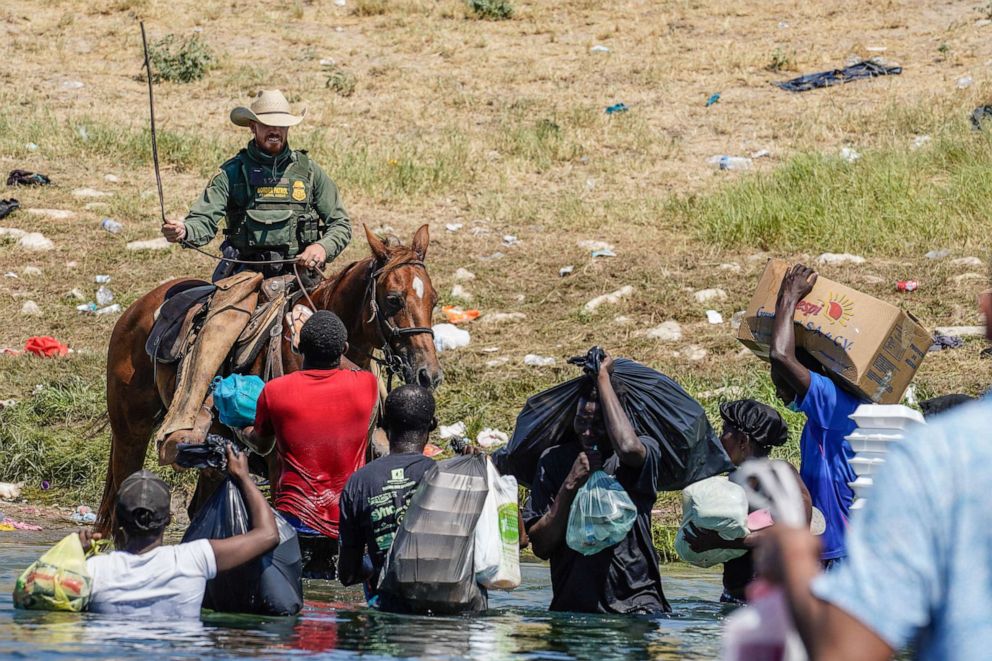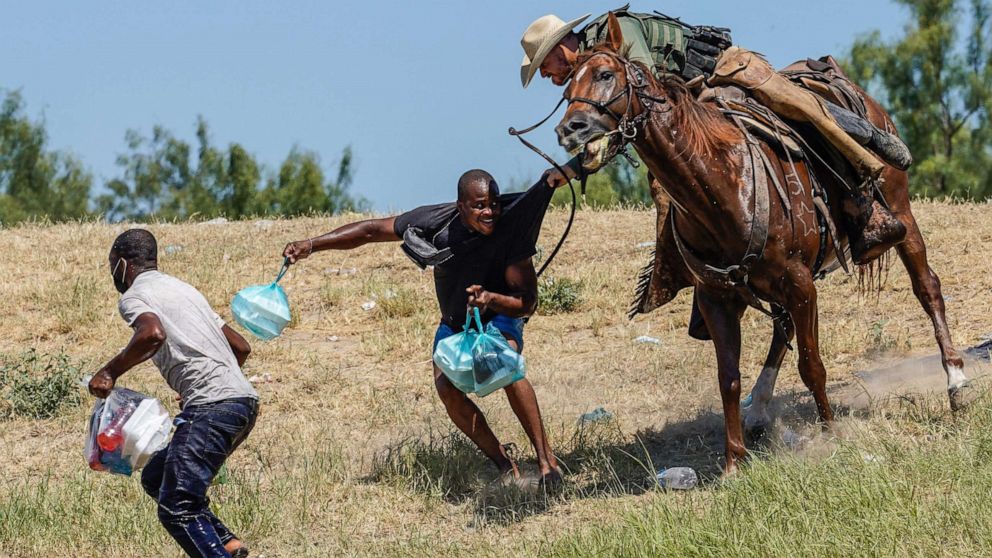U.S. Customs and Border Protection said Friday it is moving to discipline personnel who confronted migrants on horseback last year during a surge of unauthorized border crossings into Del Rio, Texas.
Border Patrol agents last September were seen in photos using their patrol horses to force migrants back down the banks of the Rio Grande and one was accused of using the long reins attached to his saddle to “whip” migrants.
No agents were found to have struck any migrant, but some of those who arrived on the banks of the river following a request from the Texas state police used unnecessary force and profanity-laden threats to push migrants back into the flowing river, according to CBP officials who discussed findings of a 500-plus page report on the incident.
“The report showed there were failures to make good decisions at multiple levels of the organization,” CBP Commissioner Chris Magnus said in a statement. “Failures to maintain command and control over Horse Patrol Units, lack of appropriate policies and training, and the overall chaotic nature of the situation at Del Rio at the time contributed to the incident. Several agents engaged in unprofessional or dangerous behavior, including one instance in which an agent used denigrating and offensive language.”
Magnus broadly outlined the changes coming to CBP based on the newly released findings and said the agency would also review its own disciplinary process following a Homeland Security-wide assessment of employee accountability last month.
Those found by authorities in U.S. territory, even if suspected of crossing illegally, are allowed to undergo immigration processing and make claims for humanitarian protections under federal law.

A United States Border Patrol agent on horseback tries to stop Haitian migrants from entering an encampment on the banks of the Rio Grande near the Acuna Del Rio International Bridge in Del Rio, Texas, Sept. 19, 2021.
Paul Ratje/AFP via Getty Images, FILE
Condemnation from the White House and President Joe Biden himself came swiftly in the days following the incident and Homeland Security Secretary Alejandro Mayorkas said internal investigative findings would be produced quickly.
“It’s outrageous, I promise you, those people will pay,” Biden said at the time, well before the internal investigation had run its course.
Additional training on CBP legal authorities and clarification of the chain of command structure are also part of the corrective actions expected to be taken by the agency.
The CBP Office of Professional Responsibility presented the case to federal prosecutors in west Texas, a common practice when federal authorities are accused of crimes. The U.S. Attorney in Texas took nearly six months before declining to pursue any prosecution in the case.
A senior CBP official said the agents involved were not interviewed about their conduct right away as part of the internal investigative process to avoid compromising a potential criminal case.

A United States Border Patrol agent on horseback tries to stop a Haitian migrant from entering an encampment on the banks of the Rio Grande near the Acuna Del Rio International Bridge in Del Rio, Texas on Sept. 19, 2021.
Paul Ratje/AFP via Getty Images, FILE
\
“It took this long because they wanted to delay the inevitable because they knew they didn’t have any legitimate charges and needed time to come up with some nonsense allegations,” National Border Patrol Council Vice President Jon Anfinsen told ABC News. “The agents have due process, so now they will get a chance to respond to the allegations, a deciding official will make the decision, and then we can appeal via arbitration, if necessary.”
The mounted patrol was temporarily suspended in the city of Del Rio, although horses continued to be used elsewhere in the area. Four CBP personnel have remained on administrative leave since last September. Those who received a disciplinary recommendation from the CBP review board tasked with personnel oversight will have the chance to respond before a final judgement is rendered. The disciplinary process remains ongoing and the results will eventually be made public, according to CBP.
U.S. Border Patrol agent on horseback try to stop Haitian migrants from entering an encampment on the banks of the Rio Grande near the Acuna Del Rio International Bridge in Del Rio, Texas on Sept. 19, 2021.
Paul Ratje/AFP via Getty Images
“In addition, CBP is conducting a review of its current disciplinary process and will make reforms as needed to ensure transparency, consistency, and accountability,” the agency said in a statement.
Rugged terrain and the inclined banked of the Rio Grande make patrolling on foot or with an all-terrain vehicle dangerous in some areas of the border, according to law enforcement officials. While the use of horses in law enforcement is commonplace, CBP officials said the agency is reviewing and making changes to horse patrol policies including the creation of new approval requirements for horses used in crowd control.

